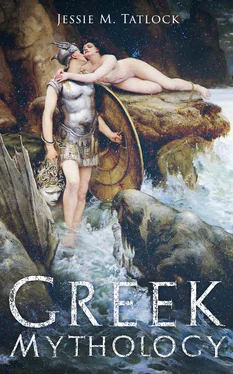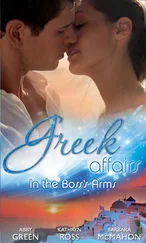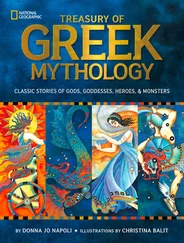(3) It was an anthropomorphic religion — that is, the gods were conceived in the forms of men, greater and more beautiful and of a finer substance, yet such as men could understand and represent. While a more spiritual conception leads to a loftier ideal, this Greek conception of the gods as of like nature with men exalts and ennobles human life and the human body and offers subjects for poets and sculptors. A purely spiritual god can never be so represented as even in part to satisfy his worshipers, but the noble dignity of Zeus, the king cf gods, was so realized by the sculptor Phidias that his great gold and ivory statue quite worthily expressed to the people their ideal. What gulf there was between gods and men was bridged by the existence of heroes or demigods, sons of gods by mortals, and of nature and powers half human, half divine.
(4) To worship and propitiate these gods, in nature so close to men, so easily understood, men needed the help of no powerful priesthood gifted with peculiar sanctity and mysterious knowledge and powers. At the great shrines, it is true, there were priests and priestesses devoted to the gods' service, and there were men and women peculiarly inspired by the god to interpret his will and give warning and pronlise for the future; but these prophets only occasionally or indirectly controlled people's actions and had little authority in determining religious belief and practice. Each father was his family's priest; each man could offer his own prayers and his own sacrifice and be understood and accepted by the god he addressed. When the family ate and drank, part of the meat and drink was offered to the gods. When they danced and sang, the gods, called on to be present, enjoyed a pleasure like their own. Even games and athletics were shared by the gods. Apollo threw the discus with his friends, and Hermes was famous for his swiftness of foot. So athletic contests became a form of worship. Business as well as pleasure was a repetition of divine actions and therefore joined with religion. Hermes was a shepherd and understood the needs of other shepherds; Hephæstus was a smith, and no human smith needed an interpreter to call upon him for aid in his craft. The gods experienced and understood, too, the different relations of life. The maiden Artemis readily lent an ear to girls who were in trouble, and the offering of their childish playthings was acceptable to her. Hera, as wife and mother, was always ready to champion mortals in those relations, while the rights of kings were very dear to Zeus, the king of gods. So all the acts of daily life, all the simple things that men used, finding their counterpart among the Olympians were ennobled and filled with religious meaning.
The gods of the Romans were just as closely connected with daily life as were those of the Greeks, but the number of deities to be recognized was vastly multiplied, and they did not appear to their worshipers as distinct personalities. No act of life, from the cooking of the family meal to the declaration of war, but was under the special care of some divinity. No material thing, from the oven in which the bread was baked to the city of Rome, but had its own indwelling deity. Even to know the names of all these innumerable divinities, much more to give them all distinct characters and to determine the best way to approach each one, was quite impossible for the busy practical citizen. Hence, a purely conventional system of religious ceremonial and invocation ran through Roman life, just as unquestioningly observed as the other conventions and regulations to which the citizens were subject. Each family under its father as head worshiped its own gods of the home and family about its own hearth, and no one could hold his place in the family without performing his duty to the family gods. So the state, as the greater family, had its own deities, its own hearth in the shrine of Vesta in the Forum, its own religious head, first the king, later under the Republic the Pontifex Maximus. State and religion were one and indivisible; failure in religious duty was failure in national duty, and a wrong committed against the civil law was a sin against the gods. This was a strong civilizing side of religion that made for good morals and good citizenship, but it lacked the inspiration of a more personal faith. Nor had the Roman gods sufficient individuality to bring into existence any body of mythology, such as that of the Greeks. The stories we are accustomed to associate with the Roman gods are either borrowed from the Greeks or were late creations of imagination inspired by and modeled on the traditions of Greek mythology.
Table of Contents
CHAPTER I
THE WORLD OF THE MYTHS
Table of Contents
The knowledge that the world we live in is a sphere and but one of an endless number that are whirling through space with incredible speed, is not a knowledge that we have by nature or by experience; we must be persuaded of this scientific fact. For as we look around us and above us, we seem to stand at the very center of a circular plane, vaulted by the sky, across whose spacious arch the sun travels by day and the moon by night. This was the view held by the Greeks of early times. To them the world was flat and round, a disk whose central point was in their own native land, in Central Greece, at Delphi, the holy place of all their race. Near and far were counted from Delphi; it was with the sacred permission of the oracle established there that those daring colonists set out who brought Greece. to the shores of Asia Minor, to Africa, and Italy.
Beyond those lands to which Greek enterprise and civilization penetrated lay distant lands in habited by strange people and monsters, the tiny race of Pygmies, one-eyed giants, and serpents. Far in the North lived a good and happy people, the Hy per bo’re ans, and to the South "the blameless Ethiopians." These had no dealings with other men, but were specially loved by the gods, who paid them frequent visits and ate at their tables. Beyond all lands, and circling the disk of earth, ran the Stream of Ocean, a great and mysterious river without a farther shore.

Fig. 1. Omphalus, copy of a stone bound with fillets that was set up at Delphi to mark the center of the earth.
The account of the beginning of this world, as the Greek poets tell it, is in one respect quite unlike the account that is found in the first chapter of Genesis. For while the Hebrews were taught that God, who existed from the beginning, created our universe of heaven, earth, and sea, and all the forms of life, ending in man, the Greeks believed that the natural world came into being by birth or generation, and that even the gods whom they worshiped were the children and successors of an earlier and more elemental race of beings.
Thus, in the beginning was Chaos, a formless misty void; next came Gæa (Earth), and Eros (Love), most beautiful of immortals. From Chaos sprang Er’e bus (the darkness under the earth) and Night. From these two were born Æther (the light of heaven) and Day. But Gæa, touched by Eros, bore U'ranus (Heaven), the sea and all the hills. Then Uranus and Gæa were united by Eros and became the parents of the Titans, who represent the great ungoverned forces of nature, and the three Cy clo’pes, who are the rumbling thunder, the lightning, and the thunderbolt; lastly, they gave birth to the hundred-handed giants, who represent the violence of the sea. When Uranus, fearing his children, the Cyclopes and the hundred-handed giants, drove them back into the earth, Gæa in her distress called upon the Titans for deliverance. The greatest of them, Cronus, obedient to his mother's call, attacked his father, and having maimed him with a sickle, seized "his power.
Читать дальше













